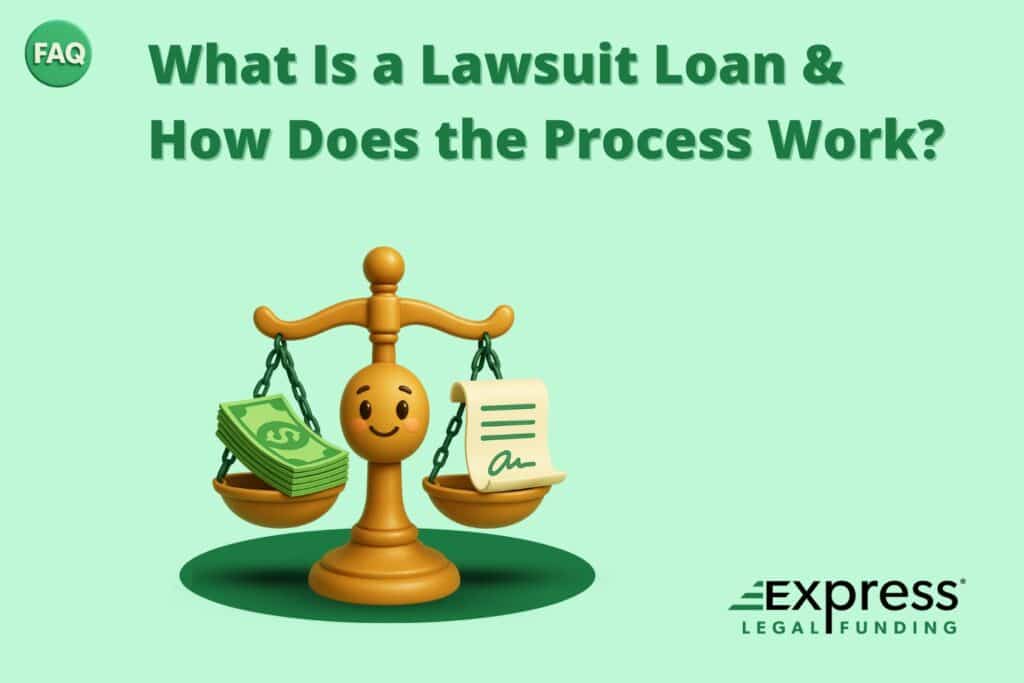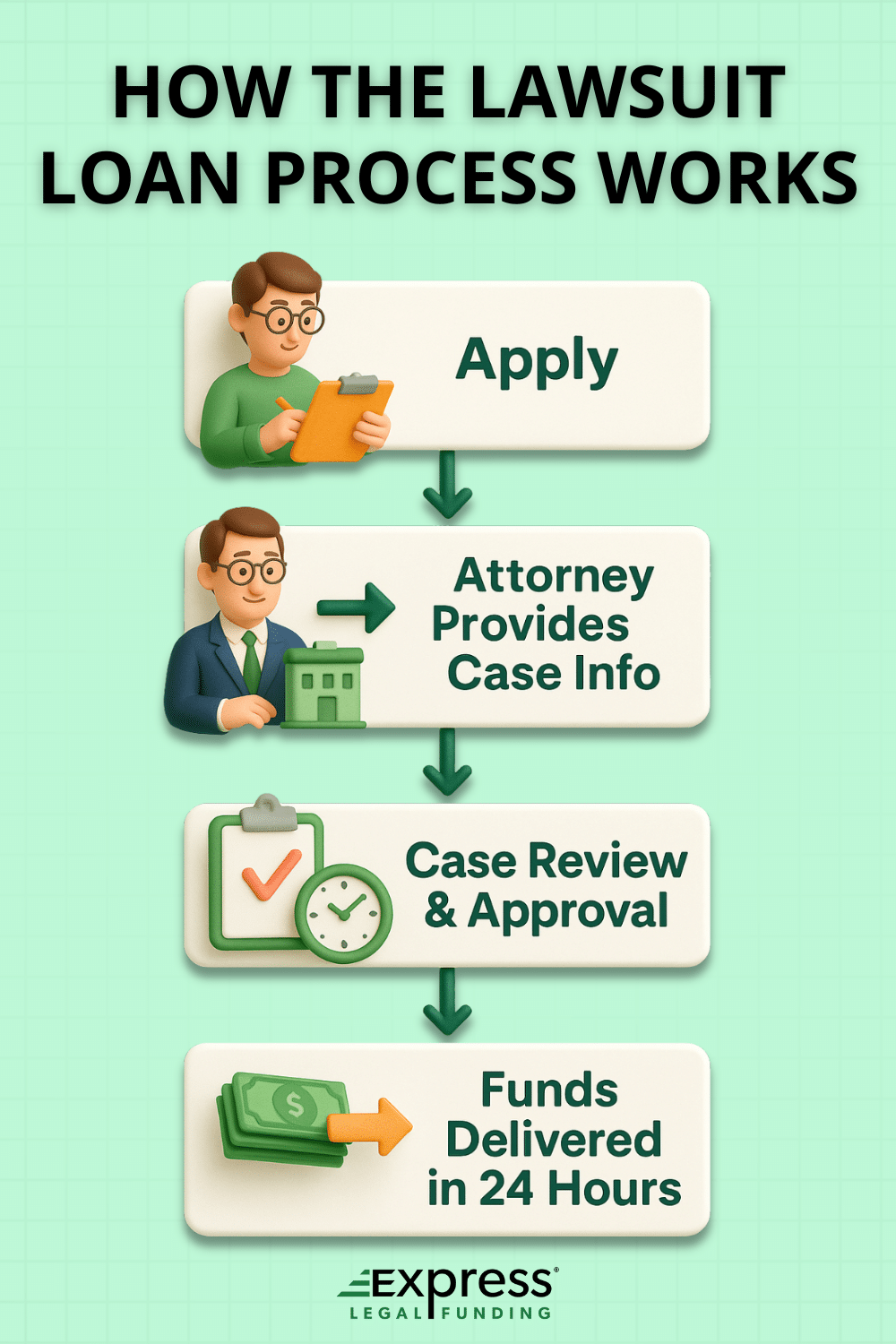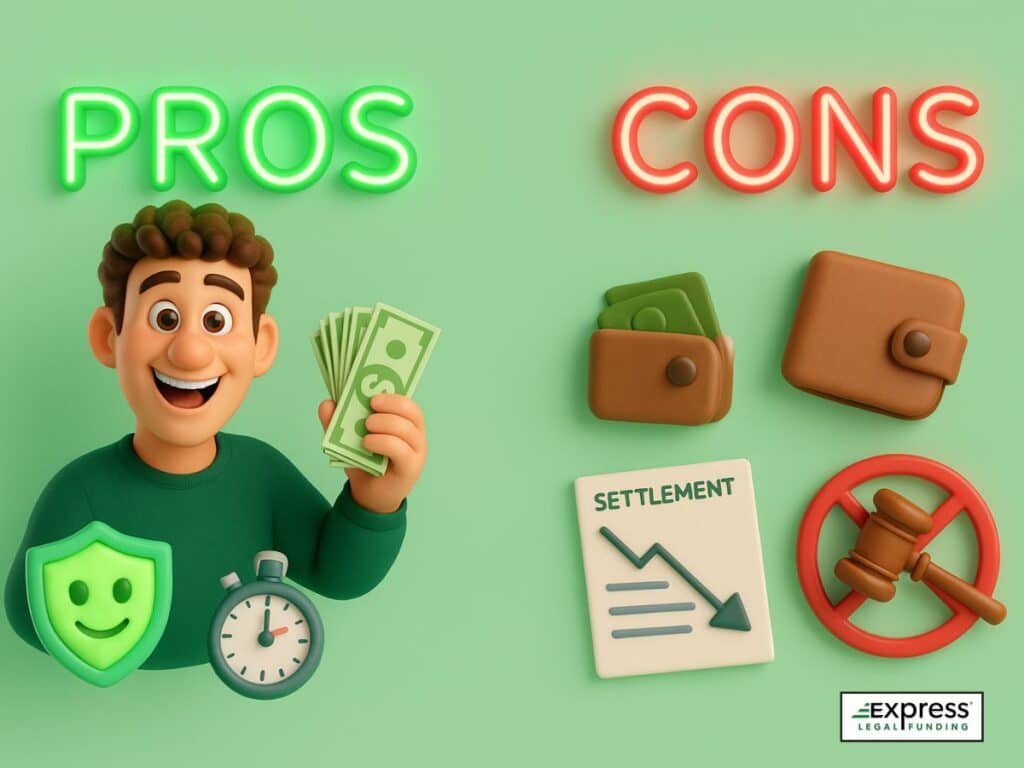Why Plaintiffs Turn to Lawsuit Loans for Financial Relief
Lawsuits can take months—or even years—to settle, leaving many plaintiffs burdened with daily expenses such as rent, medical bills, or household costs. This financial strain often forces people to consider low settlement offers simply because they cannot afford to wait.

Lawsuit loans, also known as pre-settlement funding, offer a solution. Despite the name, they are not traditional loans. Instead, they provide a cash advance on your future settlement that only needs to be repaid if your case is successful. If you lose, you owe nothing.
This type of funding is especially valuable in personal injury cases, including car accidents, slip and fall claims, medical malpractice, and wrongful death lawsuits. By giving plaintiffs access to funds now, lawsuit loans provide stability during long legal battles and allow attorneys the time they need to pursue fair compensation.

In this FAQ guide, we’ll break down what lawsuit loans are, how they work, who qualifies, their costs, and the protections available so you can make an informed decision.
Disclaimer: Although commonly referred to as “lawsuit loans”, these financial products are not loans in the traditional sense. They are non-recourse cash advances against your potential settlement or judgment. We use the term lawsuit loan throughout this page for accessibility and ease of understanding, but legally and financially, they are different from debt-based loans.
Definition & Basics of the Lawsuit Loan Process

What is a lawsuit loan?
A lawsuit loan is a non-recourse cash advance on your future settlement or court judgment. It gives plaintiffs access to money while their case is still ongoing. Unlike traditional financing, this money is not tied to your personal credit, job history, or income. Instead, approval is based on the strength of your case and the potential value of your claim.
For example, if you were injured in a car accident and your attorney is pursuing compensation, a legal funding company may advance you part of your expected settlement so you can cover bills, rent, or medical care during the lawsuit.

Is a lawsuit loan actually a loan?
Despite the name, a lawsuit loan is not a loan in the traditional sense. With a credit card or personal loan, you are responsible for repayment no matter what. Lawsuit loans work differently: repayment is conditional on a successful outcome. If your case fails, the advance does not need to be paid back.
This is based on state laws and court precedent.
This is why many providers, including Express Legal Funding, refer to them as pre-settlement funding or lawsuit cash advances, which more accurately describe the arrangement.
How do lawsuit loans work?
The lawsuit loan process is straightforward:
- Apply online or by phone.
- Case review: The funding company contacts your attorney for case details.
- Approval: If your case qualifies, you can receive money in as little as 24 hours.
- Repayment: Once your case settles, repayment is taken directly from your settlement proceeds.
This setup provides fast, risk-free access to funds for plaintiffs facing financial pressure.
Examples: How Lawsuit Loans Work in Real Life

Example: Car Accident Case
Martha was injured in a car accident and filed a personal injury lawsuit. While her attorney worked on the case, Maria’s medical bills and rent piled up. She applied for pre-settlement funding and, with her attorney’s cooperation, was approved for a $2,500 advance.
The money arrived the next day, allowing her to cover her living expenses while focusing on recovery. Months later, her attorney secured a settlement. Repayment was taken directly from the settlement proceeds, and Martha kept the remaining balance. If her case had been unsuccessful, she would have owed nothing.
Relevant guide: Can You Get a Loan on a Car Accident Settlement?
Example: Workplace Injury Case
James suffered a serious back injury while working at a construction site. His workers’ compensation claim was being disputed, and the case dragged on for months. Without income, James applied for pre-settlement funding and was approved for $4,000.
This money helped him cover rent and medical treatments until his case settled. When his attorney secured compensation, the advance was repaid directly from his award. If the case had been denied, James would not have owed anything.
Example: Medical Malpractice Case
Lisa filed a medical malpractice claim after a surgical error caused lasting complications. Her lawsuit was complex and expected to take years. Facing mounting medical bills, Lisa applied for pre-settlement funding. She was approved for a $10,000 advance, which covered therapy and household expenses.
Once her case concluded with a favorable settlement, repayment was deducted from her award. Had her case been unsuccessful, Lisa would have kept the funds without any obligation to repay.
These examples show how lawsuit loans provide practical, risk-free relief for plaintiffs who can’t afford to wait years for their case to resolve.
Lawsuit Loan Eligibility & Process

Who qualifies for lawsuit loans?
Not every plaintiff qualifies for a lawsuit loan. Approval depends on meeting a few key criteria:
- Active legal claim: You must have a lawsuit already filed in court or a legal claim under active attorney negotiation
- Attorney representation: You must be represented by a contingency fee attorney, since funding companies work directly with your lawyer to verify case details.
- Settlement potential: Your case must have clear settlement value, meaning there is a strong likelihood of compensation.
❌ Not eligible: Cases without legal representation or with uncertain liability usually do not qualify. Criminal cases, divorces, and child custody disputes are also not eligible.
What types of cases are eligible for lawsuit loans?
The most common types of cases that qualify for lawsuit loans include:
- Personal injury lawsuits: car accidents, truck accidents, slip and fall claims, and wrongful death cases.
- Medical malpractice: claims involving doctor or hospital negligence.
- Product liability: defective or dangerous products that cause injury.
- Civil rights and employment claims: wrongful termination, workplace discrimination, or harassment cases.
Because these cases often involve long legal battles and significant damages, they are good candidates for pre-settlement funding.
How do I apply for a lawsuit loan?
The lawsuit loan application process is designed to be simple and fast:
- Submit an application online or by phone in just a few minutes.
- Attorney cooperation: Express Legal Funding contacts your lawyer to gather details about your case, including liability, damages, and potential settlement value.
- Case review and approval: if your case meets the criteria, approval can happen within hours.
- Receive funds: most clients receive money in 24 hours or less after approval.
This streamlined pre-settlement funding process ensures plaintiffs can access the money they need quickly, without paperwork or credit checks.
Financial Terms of Lawsuit Loans
What are the costs and fees of lawsuit loans?
Lawsuit loans generally cost more than traditional bank loans because they are non-recourse and require no collateral. In these arrangements, the funding company assumes all the risk—if your case is unsuccessful, you owe nothing. To balance that risk, interest rates are typically higher than those for mortgages, credit cards, or personal loans, which always place repayment responsibility on the borrower.
Costs can vary significantly between providers. Some pre-settlement funding companies charge simple interest, which grows at a steady, predictable rate. Others use compound interest, which can make the payoff amount rise much faster over time. Before accepting funding, it’s crucial to understand which type of interest applies to your contract so you know the true cost of borrowing.
Example of Simple vs. Compound Interest for Lawsuit Loans
👉 Example: If you take a $3,000 advance with simple interest, you might owe $3,900 after a year. But with compounding, the payoff could be $4,500 or more over the same period.
You can see the difference in costs using our Lawsuit Loan Calculator.
At Express Legal Funding, we focus on transparent and affordable terms. You’ll know upfront how much the advance costs, with no hidden fees or surprise charges.
How is the lawsuit loan amount determined?
The amount you can receive from a lawsuit loan isn’t random. Lawsuit loan companies use an underwriting process that looks at several key factors, such as:
- Type of case: Serious injury cases usually qualify for higher advances than smaller disputes.
- Estimated settlement value: Larger expected payouts allow for larger funding.
- Insurance policy limits: The maximum available from the defendant’s insurer caps potential recovery.
- Attorney cooperation: The more details your lawyer provides, the easier it is to assess case strength.
Typical lawsuit loans range from $500 to $500,000, depending on the case. Plaintiffs should limit how much they borrow to what they need to cover essential living costs. Approved amounts are typically 10-20% of the full expected settlement. This prevents overborrowing and protects your final payout.
What happens if I lose my case? Do I have to repay the lawsuit loan?
If your case is unsuccessful, you don’t have to repay the lawsuit loan. The legal funding company accepts the loss, which is why settlement advances are considered one of the safest financing options for plaintiffs.

Can I get more than one lawsuit loan during my case?
Yes, in many situations, you can apply for more than one lawsuit loan (also called a pre-settlement advance) while your case is pending. Approval for additional funding depends on how your case is progressing, the estimated settlement value, and how much you have already borrowed.
Each request requires attorney cooperation and a new case review to ensure the advance is reasonable and won’t deplete your future recovery.
Important: While multiple advances are possible, borrowing too much can significantly reduce your final settlement payout. It’s best to only request the amount you truly need to cover essential expenses.
Pros and Cons of Lawsuit Loans

Before applying, it’s important to weigh both the benefits and drawbacks of lawsuit loans. Here are the main pros and cons:
Pros of Lawsuit Loans
| Pro of Lawsuit Loans | Details |
|---|---|
| ✅ Pro: No repayment if you lose | Lawsuit loans are non-recourse, meaning you owe nothing if your case is unsuccessful. |
| ✅ Pro: Fast access to cash | Funds are often available within 24 hours of approval, helping cover urgent expenses. |
| ✅ Pro: No credit checks | Approval is based on case strength, not credit score, job history, or income. |
| ✅ Pro: Provides financial stability | Allows plaintiffs to pay rent, medical bills, or living costs while their lawsuit is pending. |
Cons of Lawsuit Loans
| Con of Lawsuit Loans | Details |
|---|---|
| ❌ Con: Higher costs than traditional loans | Interest rates are higher because funding companies take on all the risk. |
| ❌ Con: Reduces your final settlement | Repayment comes directly out of your settlement, lowering your net payout. |
| ❌ Con: Multiple advances can add up | Borrowing too much may deplete your future recovery. |
| ❌ Con: Not available for every case | Criminal, divorce, and child custody cases do not qualify for lawsuit loans. |
Lawsuit Loans vs. Traditional Loans vs. Credit Cards
While lawsuit loans are often compared to personal loans or credit cards, they work very differently. The key distinction is that repayment is tied to your settlement—not your income, credit score, or ability to make monthly payments. Here’s a side-by-side look:
| Feature | Lawsuit Loans (Pre-Settlement Funding) | Bank Loans | Credit Cards |
|---|---|---|---|
| Repayment Requirement | Only if your case settles successfully; nothing owed if you lose | Repayment required regardless of outcome | Repayment required regardless of outcome |
| Risk Level | Low – no personal liability | High – borrower is fully liable | High – borrower is fully liable |
| Credit Check Needed | No | Yes | Yes |
| Approval Basis | Case strength and potential settlement value | Income, credit score, and debt history | Credit score and available credit limit |
| Monthly Payments | None | Yes, fixed monthly payments | Yes, minimum monthly payments required |
| Collateral Required | No | Sometimes, for secured loans | No |
| Funding Speed | Typically within 24 hours | Days to weeks | Instant access to available credit |
| Cost | Higher than traditional loans due to non-recourse risk | Lower interest rates, more affordable if qualified | High APRs and potential compounding interest |
| Best For | Plaintiffs waiting on settlements who need risk-free cash now | Borrowers with strong credit and stable income | Short-term purchases repaid quickly |
Why Lawsuit Loans Are Safer Than Traditional Loans
Unlike bank loans or credit cards, lawsuit loans and pre-settlement funding are non-recourse and carry no personal liability. That makes this type of legal funding a unique and safer option for plaintiffs who need fast, risk-free cash to cover living expenses while waiting for their case to resolve.
In addition to comparing lawsuit loans with traditional financing, it’s also important to understand other funding alternatives that may be available.
Alternatives to Lawsuit Loans and Legal Funding
While lawsuit settlement loans can be a lifeline, they aren’t the only option. Depending on your situation, you may want to consider these alternatives:
1. Personal Loans
- Offered by banks or credit unions.
- Require good credit, income verification, and repayment regardless of your case outcome.
- Lower interest rates than legal funding options, but carry full personal liability.
2. Credit Cards
- Quick access to funds if you have available credit.
- May be suitable for short-term expenses, as cardholders can avoid interest charges if the balance is repaid in full within the billing cycle.
- High APRs and compounding interest make them risky if balances carry over.
3. Borrowing from Friends or Family
- Flexible repayment terms, often interest-free.
- Avoids high costs but may create personal strain if repayment is delayed.
4. Payment Plans or Medical Liens
- Some doctors and providers offer treatment on a lien basis—payment is deferred until settlement.
- Reduces immediate financial pressure without borrowing cash.
5. Community or Government Assistance
- Programs may cover essentials like housing, utilities, or food.
- Nonprofit aid can sometimes offset urgent expenses without debt.
Read our full guide: 15 Alternatives to Lawsuit Loans
Are Lawsuit Loans Safe? Risks and Protections Explained
What does “non-recourse” mean for lawsuit loans?
Non-recourse funding means the lawsuit lender’s repayment rights are limited only to the settlement proceeds. If the case doesn’t end in compensation, you walk away without owing anything further. This structure shifts the financial risk from the plaintiff to the funding company.

Do lawsuit loans affect your credit score or credit report?
No, lawsuit loans do not affect your credit score or appear on your credit report. Unlike traditional lenders, legal funding companies do not perform hard or soft credit inquiries, and repayment isn’t reported to credit bureaus.
Approval is based solely on your case strength, not your financial history. This makes lawsuit loans (pre-settlement funding) accessible to plaintiffs who might not qualify for traditional financing.
Relevant read: Do Pre-Settlement Funding Companies Require Credit Checks?
Are lawsuit loans taxable income?
No, lawsuit loans are not taxable because they are not considered income. A lawsuit loan is a cash advance against your future settlement, not wages or earnings. Since repayment only comes from your case proceeds, the IRS does not treat the advance as taxable income.
However, the final lawsuit settlement itself may be taxable depending on the type of damages (for example, punitive damages are usually taxable, while compensation for physical injuries is not). Always consult a tax professional about your specific case.
Do consumer protections exist for lawsuit loans?
Yes. Several states, including Illinois, Ohio, Oklahoma, Missouri, and Utah, have enacted laws to regulate pre-settlement funding. These laws require companies to provide clear contracts, transparent fee disclosures, and limit unfair practices.
Even in states without specific regulations, reputable companies like Express Legal Funding go beyond the minimum. We follow legal funding industry best practices to make sure every client receives upfront, easy-to-understand terms—no hidden costs, no fine print surprises.
These protections ensure lawsuit loans remain a safe financial option for plaintiffs who need immediate relief while pursuing justice.
Attorney Role and Settlement Effects of Lawsuit Loans
Do I need my attorney’s approval to get a lawsuit loan?
Yes. Your attorney must participate in the process. Funding companies rely on your lawyer to provide case information and to sign off on the agreement. This protects you, since it ensures the loan terms are fair and that funding won’t interfere with your case. Without attorney cooperation, you cannot receive pre-settlement funding.
Relevant read: Can I Get Pre-Settlement Funding Without Attorney Consent?
How does a lawsuit loan affect my settlement?
Repayment is taken directly from your settlement check before you receive the remainder. This means your final payout will be smaller, but it can also give you more time and financial stability to pursue a larger settlement. For example, instead of accepting the first lowball offer, you may have the resources to hold out until your attorney negotiates a fair result.
What should I discuss with my lawyer before applying for a lawsuit loan?
Before moving forward with a lawsuit loan, it’s smart to have a detailed discussion with your attorney. Key points to cover include:
- Funding amount: How much do you actually need? Borrowing less helps you preserve more of your eventual settlement.
- State regulations: Lawsuit funding rules differ by state, so confirm what applies to your case.
- Repayment terms: Review how repayment will work and how it will affect your net recovery.
When your lawyer is involved early, a lawsuit loan can serve as a helpful financial tool instead of creating unnecessary strain.
Why is Express Legal Funding the best company for lawsuit loans?

Not all lawsuit loan companies are the same. Many operate as brokers, adding extra costs and confusing terms. At Express Legal Funding, we do things differently.
- Direct Lender Advantage: We are a direct funding company, not a broker. That means lower costs for you and no hidden middleman fees.
- Transparent Terms: From the start, you’ll know exactly what your funding will cost. We don’t use fine print or vague contracts. Our goal is to provide clarity, not confusion.
- Fast Approvals: We understand that plaintiffs often need money right away. That’s why we work with your attorney quickly and deliver funding in as little as 24 hours.
- Same-day Funding: We offer multiple same-day funding options, including same-day ACH and e-check for instant delivery.
- Risk-Free Guarantee: If you don’t win your case, you owe nothing. Period.
- Personal Injury Focus: Most of our clients are accident victims dealing with medical bills and lost wages. We’re experienced in helping people facing those exact challenges.
With Express Legal Funding, you can feel confident knowing you’re getting honest, affordable, and fast financial support while your attorney fights for the settlement you deserve. We’ve funded thousands of plaintiffs since 2015 and are BBB A+ accredited.
Additional Lawsuit Settlement Loan FAQs
Still have questions? Explore more of our detailed FAQ resources:
- Do I Need a Lawyer to Get Legal Funding?
- How Much Does Pre-Settlement Legal Funding Cost?
- Do I Have to Pay Taxes on Pre-Settlement Legal Funding?
- What Are the Pros and Cons of Pre-Settlement Funding?
Closing Thoughts on Lawsuit Loans and Pre-Settlement Funding
Waiting for a lawsuit to settle can feel like a financial battle of its own. Bills keep coming, medical expenses pile up, and daily living doesn’t pause for the legal process. A lawsuit loan—more accurately known as pre-settlement funding—offers a way to ease that stress. Because repayment is tied only to a successful settlement, this type of funding is both safe and risk-free.
Apply for a Risk-Free Lawsuit Loan Today
At Express Legal Funding, we make the process simple: you can apply in minutes, we review your case quickly, and you often receive cash in 24 hours or less once approved. With transparent terms and no hidden fees, you can focus on your case while we help with your immediate financial needs.
👉 Don’t wait for your case to drag on. Apply for a risk-free lawsuit loan online today and get the cash you need now. You can also apply by calling us at (888) 232-9223. Our helpful customer service team is available to answer your call anytime, 24/7.

